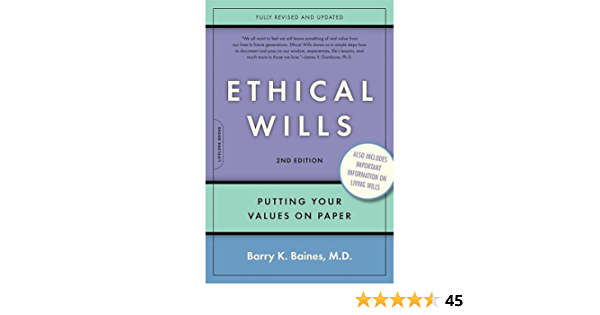Ethical Wills -
Why You Should Write One
Values - we all have them even if we are not consciously aware of them. The things that are most important to us in our life journey shape and influence us everyday. The need to be in touch with these values and communicate them to others has spawned a growing trend of writing Ethical Wills.
 Photo by Sven Mieke on Unsplash
Photo by Sven Mieke on UnsplashThe popularity and necessity of "last wills and testaments" or "living wills" is well established. These documents are important for legal reasons. An Ethical Will, however, is just as important, maybe more so. An Ethical Will is not designed as a legal document but it serves the useful purpose of communicating our most cherished values and passing of life lessons to our family, friends and loved ones.
The Importance of An Ethical Will
The importance of creating an Ethical Will has been documented in a number of recent articles. The AARP magazine, for instance, states that it is a growing trend, especially among those concerned with estate planning and including many financial planners. But the article rightly points out that the purpose of such a document is much more about values than valuables.
It's not uncommon to find press in newspapers and other major publications (including Time magazine, the Washington Post, Christian Science Monitor and PBS Television) that are addressing the growing popularity of ethical wills. Another article mentioning the importance and growing interest in ethical wills has appeared in the New York Times. In The Ethical Will, an Ancient Concept, is Revamped for the Tech Age by Constance Gustke, we again learn of personal historians encouraging people to create the ethical will. As boomers age the interest in life story writing will continue. Writing an ethical will is a relatively easy way to record your most important life lessons, beliefs and values.
The reasons for having your own Ethical Will are self-evident. It is a way to pass on values with the hope of a continuation for future generations. It helps us document the meaning and purpose of life. You can communicate what is most important to you and what you stand for.
Ethical wills are important for sharing life lessons for your family
You can also share your hopes and dreams for the future and give your blessings. Think of it as a love letter to your family and friends. It can also be an important way to tie together the parts of your life and to do something extremely important before you die - to grant forgiveness where needed and to provide a sense of completion.
You will also learn a great deal about yourself.
This alone can be a major motivation for creating your personal Ethical Will. One of the reasons I like to journal is that I discover with greater clarity what my life is about and what I am living for. This includes my likes and dislikes, my spiritual values and the various challenges I face on my life journey. An Ethical Will can serve as a summation of all the above.

Barry Baines, a 30+ year health care professional, is an expert on ethical wills. His book, Ethical Wills:Putting Your Values on Paper, has long been considered an important resource. Living Wisely hosts a great deal of information by him and others that can help to guide you.
There is not any particular time in life you must wait for to begin an Ethical Will. More couples are discovering the benefit of doing it when they get married. Likewise, it can be beneficial for divorced couples with children to create one to share their common values for them and to get past the "blame" situations that often result from a separation.
Expectant and new parents will discover that the process can help guide them in parenting. Middle age assessment, times of life change (new career, retirement, empty-nesters) and end-of-life periods are also appropriate times. As you can see, anytime is good to begin.
So, how do you start?
Don't overwhelm yourself with a big writing project. It's not hard to create an Ethical Will. The easiest way to begin is to create a written outline and simply record the enduring values and lessons of your life.
Your outline can include:
- Your beliefs and opinions
- Things you did to act on your values
- What you've learned from grandparents / parents / siblings / spouse / children
- What you've learned from experience
- What you are grateful for
- Your hopes for the future
After you've written a bit about each category put it aside for a few weeks and reflect on it. Then come back and write more, expanding each category into a paragraph. Rest, review and revise.
Creating your Ethical Will can be one of the most important things you ever do.
It can be a very real summation of your life lessons and values and can provide a cherished written legacy for your loved ones. We have all heard that what we regret on our deathbeds is typically that we should have told others more about how much we care about them. Writing an Ethical Will will be one thing you won't regret.